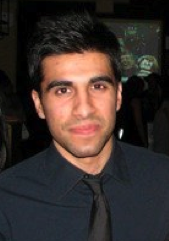Advice from Sachin Seth
Internships are the key to the industry. If you want to make serious connections in the field, the best way is by completing as many internships during your university career as you can.
I got really, really lucky. I scored two really great internships in 2010, one at the CNN world headquarters in Atlanta, and the second at the CBC’s foreign bureau in London, England.
It was a great opportunity for me to see the contrast between two of the biggest journalism organizations in North America.
I learned a lot, but there was one thing I learned that made me especially happy. If you’re a visible minority (I’m South Asian) don’t pay attention to the stats that tell you that you have a less of a chance of making it big. In a world that’s this globalized, journalists of diverse backgrounds are gaining a lot of support from upper management in big organizations, so the shift in employment is in your favour.
Since finishing the pair of internships, I’m frequently asked two questions:
Question One: “what does a correspondent actually do on a daily basis?”
Last fall, I got the incredible opportunity with the CBC’s new London correspondent Susan Ormiston for six weeks. The London bureau was really small (about 11 full-time staff) and the place gets pretty hectic on filing days.
For example, when Susan had to file a story on the announcement of Prince William and Kate Middleton’s engagement, we were out all-day shooting visuals, interviews by Buckingham Palace, and doing live hits with the studio back in Toronto. Susan was writing her script for the final piece while out in the field, and when we got back in the evening, she voiced it and oversaw the editing process through until the end (which wrapped up around midnight or 1 a.m). That was a 14-hour day.
The days can be long and jam-packed, but really, the work is incredibly fun and there is very little repetition. You come into work with something new to do everyday, and that’s one of the joys and main attractions of the field.
In short, a correspondent may not have the same thing to do on a regular basis. Depending on his or her position, he or she may or may not file everyday. On non-filing days, the correspondent usually works on future stories, by researching and doing pre-interviews with future subjects. Their interns or assistants help with streeters*, doing pre-interviews, researching and, on occasion, writing.
_________________________________________
*streeters: non-gender-specific version of what used to be called the man-in-the-street interview. “Go out and shoot some streeters on gas prices.” Also known as voxpops (Latin: vox populi, voice of the people).
_________________________________________
Question Two: “What does an anchor do all day before going on-air?”
Before my internship in London, I was at CNN in Atlanta for 9 weeks, working almost 60 hours a week. I worked, for the most part, on a specific show called “CNN Newsroom with Don Lemon.” I got to see first-hand what a national anchor does every day, and how crucial his supporting cast is to the successful execution of the show.
Don, like most anchors, does not write his full script (that would be impossible, especially for shows that go on for one or two hours). He did however write the tease* for every show, and read over his scripts several times before going on-air, just to make sure he was familiar with the material.
He also made executive decisions on which stories to include and not include, and was heavily involved in story meetings on the two days leading up to his weekend shows, as well as on the day of the shows.
Don did a number of live interviews on his shows as well, many times with questions that were written for him but that included a lot of his own input. Of course, the live follow–up questions were his responsibility.
Being a correspondent/anchor/reporter/any type of journalist is really hard work. As you’ve probably have heard a thousand times already, the hours are horrendous, the pay is usually pretty sub-par, the work is stressful and can be depressing. But the type of people who work in the industry are probably the kindest and funniest people you’ll ever meet. The people who practice journalism do it for the love of the work, and because they feel a responsibility to educate others on subjects that they care about.
If you feel the same way, then you’re in the right field.
_________________________________________
*tease: a promo which doesn’t give away the kernel of the story. “This man has committed no crime, but he’s wanted across Canada. We’ll have his story…later on the show.”
_________________________________________
About Sachin
- Name: Sachin Seth
- J-school: Ryerson University, Toronto, ON
- Current/Past employers: CNN, Blastmagazine.com
- Platforms: Online, TV, Radio
- Publications: CNN.com, Globalpost.com, Blastmagazine.com
- Twitter: @sachinseth
- Website: http://sachinseth.com
- Sample work:
Public audit finds TTC conditions ‘bad’
Protected by online anonymity, hate speech becomes an online mainstay [online]



[…] Behind the scenes with TV personalities « So, you want to be a … […]
[…] Behind the scenes with TV personalities [Working with TV correspondents and anchors] Advice from Sachin Seth […]